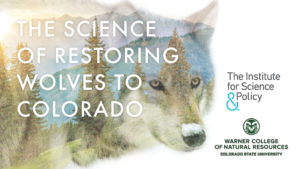
A free, five-part web series will explore Colorado wolf reintroduction through the lens of science, policy and lived experiences. The series aims to discuss the implications of the gray wolf reintroduction Ballot Proposition 114 that will appear on the Colorado ballot in November. If passed, the initiative would charge the Colorado Parks and Wildlife Commission to reintroduce wolves to the state no later than 2023.
The virtual presentations will be co-hosted by the Institute for Science & Policy and Colorado State University’s Warner College of Natural Resources, in partnership with the Center for Collaborative Conservation, the Center for Human-Carnivore Coexistence, CSU Extension and the Denver Museum of Nature & Science.
In January 2020, a pack of wolves were confirmed in northwest Colorado, signaling the return of Canis lupus to Colorado after a near 80-year absence. As Colorado’s only land-grant institution, CSU is uniquely positioned to provide science-based information regarding wolf restoration to the state, said Kevin Crooks, director of the Center for Human-Carnivore Coexistence at CSU.
“The prospect of the return of Canis lupus after a nearly 80-year absence is a contentious topic that taps into diverse emotions and passions across various groups,” Crooks said. In response, CSU researchers studying wolf restoration began exploring how society can have an effective dialogue on this topic, using science to inform policy and management.
The web series offers a multi-dimensional view of wolf recovery in Colorado, including perspectives from wolf experts, ranchers, and panelists with a variety of views on wolf reintroduction. “Through the series, people can expect to learn about what it might mean to have wolves in Colorado,” said John Sanderson, director of the college’s Center for Collaborative Conservation.
“Attendees can gain a better understanding of wolf biology and ecology, as well as hear the views of people who have a close connection with wolves through their work. We hope this informs the Colorado public so we can address this challenge together.”
The free web series will be held virtually Sept. 24, Oct. 1, Oct. 8, Oct. 15, and Oct. 22 at 5 pm MT. Registration is open to the public. All episodes are recorded for later viewing. To view past episodes, visit Center for DMNS Facebook page or Institute for Science & Policy YouTube channel.
Episode 1: The Science of Restoring Wolves to Colorado
Thursday, September 24 at 5 p.m. MTIn the premiere episode, panelists will discuss wolf-related policy and the latest science pertaining to wolf ecology, interactions with big game and livestock, and safety of people.
Panelists: Stewart Breck, Research Wildlife Biologist, USDA Wildlife Services; Kevin Crooks, director of the Center for Human-Carnivore Coexistence and Professor in the Department of Fish, Wildlife, and Conservation Biology at CSU
View recorded video of the past event.
Episode 2: Media Coverage and Public Perceptions on Wolves
Thursday, October 1 at 5 p.m. MTPanelists: Sam Brasch, reporter for Colorado Public Radio, and Rebecca Niemiec, assistant professor, Department of Human Dimensions of Natural Resources at CSU
View recorded video of the past event.
Episode 3: Community Perspectives and Conflict over Wolves
Thursday, October 8 at 5 p.m. MTPanelists: Bill Fales, rancher, Crystal River Valley, Colorado; Jonathan Proctor, program director of the Rockies and Plains Program, Defenders of Wildlife
Episode 4: The Values and Costs of Wolves
Thursday, October 15 at 5 p.m. MTPanelists: Stanley Asah, professor in the School of Environmental and Forest Sciences, University of Washington, Shauna Baron, naturalist guide, Yellowstone National Park, and Dana Hoag, professor, Department of Agricultural & Resource Economics at CSU
Episode 5: The Experience of Living with Wolves
Thursday, October 22 at 5 p.m. MTPanelists: Denny Iverson, rancher and logger, Iverson Ranch in Montana, Secretary of the Blackfoot Challenge; Kim Skyelander, associate director, Center for Collaborative Conservation at CSU